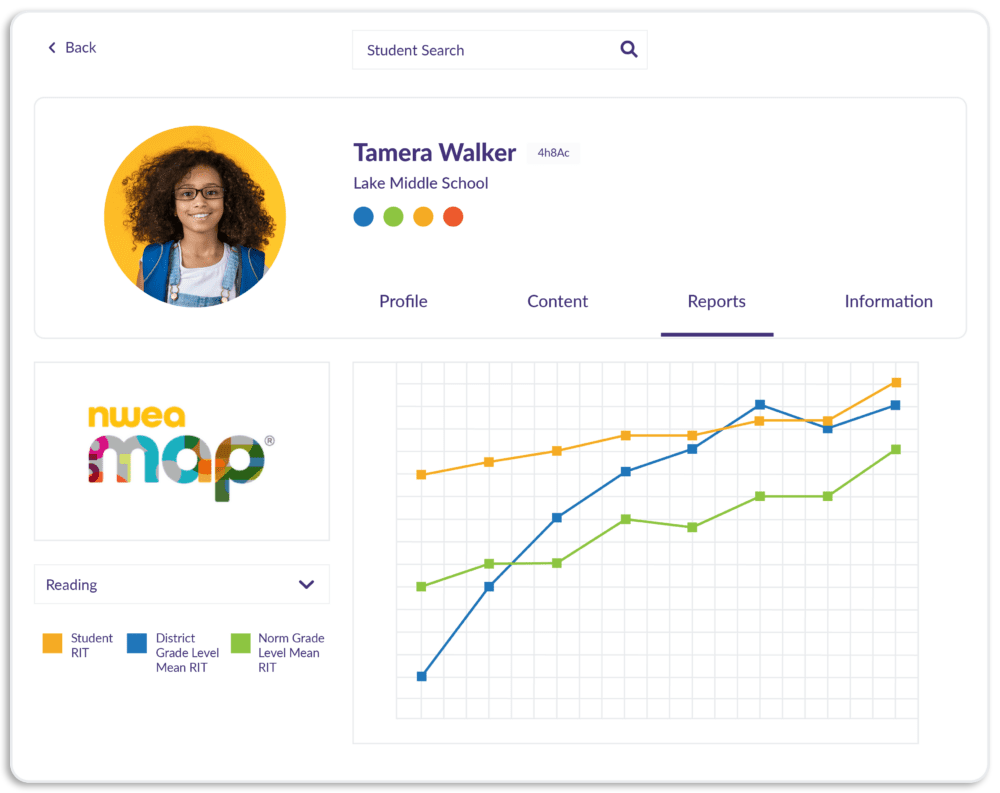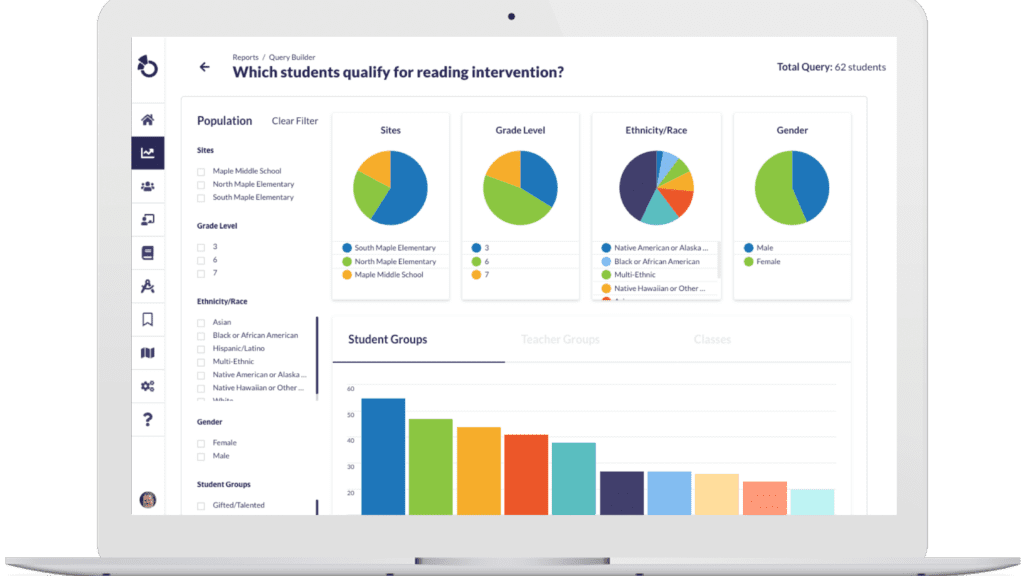Unlocking Educational Success: Insights on Data-Driven Strategies
At our recent Otus Regional Workshop in Salem, WI, we took a break from a busy day of learning and collaboration to sit down with Craig Velleux, the Data Specialist at Salem Grade School. Craig and his team have been instrumental in advancing the school's data-driven initiatives. In our conversation with Craig, we uncovered valuable insights into how the school is leveraging data to enhance its educational practices. Meet with the Otus team to see how Otus can support your school.
Transforming Math Assessment and Feedback
Salem School District recognized the need for a more efficient system to assess student performance in math and provide timely feedback. The goal was to quickly identify student learning strengths and areas of opportunity, enabling teachers to adjust their instructional strategies. The integration of Otus into their system has been a game-changer, providing immediate, actionable insights and significantly improving the feedback loop in math education.
Targeted Support for Diverse Student Needs
Addressing the diverse needs of students was a key challenge for Salem School District. Its team was in search of a comprehensive solution that could merge various data sources for a complete view of student performance. This was particularly important for customizing interventions for both special and general education students. Otus has been instrumental in meeting this need, offering a platform for educators to consolidate assessment data and effectively track student progress.
"Otus allows us to take all of our third-party data and put it together. We have our NWEA MAP growth test, our aimswebPlus screeners, benchmarks, our Forward state testing data, and then we can combine that with how they're doing in the classroom and get the full picture of the students."
Craig Velleux
Data Specialist
,
Salem Grade School
Enhancing Data Accessibility and Collaborative Efforts
Salem School District previously grappled with the challenge of accessing and sharing comprehensive student data, as it was spread across various platforms. The district was in need of a streamlined solution to make this information easily accessible to teachers, counselors, and student services staff.

The Otus student profile paints a detailed picture of the whole child and houses data from national and state measures as well as attendance, social-emotional learning, and more.
The introduction of Otus addressed this need, bringing together all student data points. This shift not only saved time but also improved collaboration among staff, leading to more informed decision-making and timely interventions for students.
Hillary Kleppel
All right, welcome. Can you please tell us your name, school, and your role?
Craig Velleux
My name is Craig Velleux, and I work at Salem Grade School in Kenosha County in Wisconsin and my role is the Data Specialist.
Hillary Kleppel
We love data with Otus. Tell me a little bit about Salem. What makes it so special? What do you love about it here?
Craig Velleux
We're kind of a rural school with a bigger rural school or a smaller urban school. We're a 4K-8 building. Just our mix of kids makes it pretty unique in the set up of our school. The building itself, the staff is amazing. It becomes more and more like family. I actually met my wife here. We work together, so, yeah, she's a second-grade teacher. But our administration, we got new administration last year and just kind of took off in a new direction that seems to be very positive, and they're very trusting of all of the staff to do things without having to micromanage, which is nice.
Hillary Kleppel
That's nice. Yeah. You guys are about a year into Otus. What has that journey been like? What has the buy-in been like from your teachers, being a former teacher?
Craig Velleux
The journey has been kind of interesting. Our district administrator, Dr. King, came in new last year and brought Otus in with her. And she kind of told me, she's like, learn this program. We need to make this work. And so through the OCE program with you learned a lot, you know, last year was kind of just in the infancy. Seeing what the program has to offer, kind of coming up with a plan of how we can use it. We tried some stuff out last spring with it, and now we're kind of full on in there. Right now we use it mostly for our math assessments. That's kind of where we started, and it's just been crazy. The teachers right now are loving the results. We have assessments. We've put them in Otus, and now we have instantly actionable data. So they take the assessment one day, the next day I give them a report that's like, here's how your kids did on the assessment. Here's the standards that we're strong at. Here's the standards that we're weak at, and here's how we can combat that. So it just gives us those instantly actionable items instead of waiting weeks or having to compile it, it takes all this stuff and puts it together for us.
Hillary Kleppel
That dive in, that student growth action. Yeah. That's awesome. Can you tell me about the impact that Otus has had on your student support educators?
Craig Velleux
Student support educators. I'm actually part of one of those. I do some math intervention as well, but it helps us identify the kids that are most in need. So Otus allows us to take all of our third-party data and put it together. We have our NWEA Map growth test, our aimswebPlus screeners benchmarks. We do that, our Forward state testing data, and then we can combine that with how they're doing in the classroom and get the full picture of the students and kind of decide which kids need the most help. And then with the regular assessments in the standards, it also helps us decide what specific avenue to take with the specific kids. So it's actually quite useful.
Hillary Kleppel
Helpful. So you are the data specialist here at Salem. So you're working, I would assume, close with our data team. What has that process looked like, getting the data over to Otus? Difficult, hard, easy?
Craig Velleux
It's actually quite easy. With NWEA, there's the direct link, and they just pull the data for us. Aimsweb, they don't have it yet, but all I do is download. Like, I go to the export data file in aimsweb and I just put it in share file. And Matt, Zach, whoever. Yeah. You get to know these people by first name really fast. They're super friendly in that, and they get back to you, and then they're like, here's what it is. And go. And I go in there, like, two days later, and there it is. Even this year, we figured out we can put our progress monitoring data in there. So I do some math intervention. We have our reading intervention department, and they do their interventions, and that all gets housed in aimsweb. And the data upload team, like, I just once a week, take this file, download it, send it to them. And they've actually built separate things in third-party data for us just to house the intervention pieces. So it's separate from the benchmark testing. Our special ed department loves it.
Hillary Kleppel
How's the viewership been from the teachers who aren't part of that data team, like yourself and them working with Matt and Kris, but able to see all of the data in the third-party data sections. How's that been?
Craig Velleux
They're in the infancies, they want to know how to see it, and then I show them, and then they're in there, they're looking. It's been the most beneficial for student services. Our guidance counselors, our psychologists, our speech and language pathologists, they now have access to all this information that they would have had to go around about to get. And they can see what's been done. And it takes data all the way back.
Hillary Kleppel
We're going to talk a little bit more about the data process. And I know, I think we've spoken before about the student profile. Can you speak to that particular student profile and the data landing page and being able to view individuals for maybe the counselors or the special ed team that you've said?
Craig Velleux
Yeah, like the student profile, it's very easy to actually navigate. You go into the student profile and you get information about the student. There are several different tabs in there, and one just says reports. And you click on the reports tab. And our teachers are really good about being able to go. And not just teachers, but the staff as a whole. You click on reports and their assessments are there. So you get a quick snapshot of how they're doing on their assessments in class right away. You scroll down and every piece of third-party data that they have is there. So in the past, the guidance counselor was like, I need to know this kid's map score, this kid's aimsweb score, and they don't have access to all of that information. Where now they do, they just scroll and they can see, well, this kid is this percentile. This kid is this percentile here that doesn't match up. And they're getting actually quite efficient at not having to contact me anymore.
Hillary Kleppel
They're going to get there. So it's safe to say there was at one point, maybe a year, two, three years ago, where you were in the NWEA site, in the aimsweb site, in another site, and now we're kind of all under one.
Craig Velleux
Yeah. And it's, and it's in addition to grades. So no matter what, we've never had a thing that brought all of it together before, plus the monitoring piece for any kid that's getting intervention. So it's all right there.
Hillary Kleppel
Cool. So, last thing. You are part of our Otus Certified Eaboutducator program. I always call you out as our champion rock star of it all. Can you speak a little bit to the Otus Certified Educator program? How it helped you out, how it kind of informed you what you liked about it or what you didn't like?
Craig Velleux
It's easy, it's convenient, it's on your own time. Like you do it in whatever time you want. But the best part is, it's like, I get to see the student side of things first, and a lot of the programs, you don't. You get to see one aspect and you don't understand how all of it works. Otus has the student side, it has the teacher side, it has the administrative side. And you get to learn all of it kind of at the same time. You get to be the student. You get to see the stuff. You get to be the teacher again, come back into that role. But it lets you fumble through it. It gives you the chance to take chances to mess up. Like you're trying to figure out how to make assessments. You mess them up, and that's okay. It's a very safe space, and the support is awesome. You get responses back real quick.
Hillary Kleppel
Cool. Thank you. Thank you so much.
Related Resources
Request a demo!
See exactly how Otus can help your school accelerate student growth and improve student outcomes – all while saving educators time.

